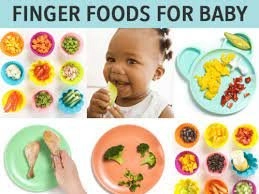Introducing Finger Foods
Once babies are adept at eating soft, pureed foods, they may be ready to transition to finger foods by about eight months. and become more efficient and independent by mastering pinching in about nine months.At this point, they can pick up small chunks of food with their thumb and forefinger.
Babies may be reaching for everything on their plate, but follow these guidelines for healthy and safe eating.
• Start with menu items such as chunks of soft cheese. small pieces of pasta or bread; finely chopped soft greens; fruits such as bananas, avocados, ripe peaches and nectarines. Your baby may not yet have teeth, so minimal chewing is enough for these foods. Don't feed hot dogs, raw vegetables, nuts, meat, candy, or sticky textures like nut butters. The risk of suffocation increases at this stage.
• If allergies are a concern, introduce new foods gradually.
• Cut all foods into soft, bite-sized pieces no larger than 1/2 inch.
• Choking Beware:
Avoid round, hard foods like carrots, grapes, hot dogs, and all raw vegetables and peanuts. Raisins and popcorn are dangerous for babies.
• Adhere to formula and breastfeeding schedules. However, if your baby eats a lot of solids, he will automatically produce less milk. Babies should start eating more solids and less milk at this stage to get nutritional value.
baby growth this week
Babies get stronger and can even move, like rolling on their tummy back, slouching on their bottoms, and actually crawling forward. If you haven't childproofed your home yet, the wait is over.
You may notice these growing signs of motor development:
• Your baby can probably sit up on his own without using his hands for a few minutes and may be able to stand up on his own. • They should be able to hop and possibly even pull themselves up into the stand while providing support.
• Little hands are becoming more agile and getting better at passing toys from one toy to another.
You may be wondering:
• Your vision. Babies can see as far as adults and can follow moving objects with their eyes.
• Fear of strangers. You don't imagine it:
You may be afraid of new people or situations. So when he's upset, give him time to warm up and calm down.
• What they can understand. Babies may understand more than you think, so it's a good idea to talk to them about everything you do and be consistent with the language you use for familiar things. It is important.
Month 7 Week 3 Tips
• If your family has food allergies, talk to your pediatrician about introducing highly allergic foods such as peanuts and eggs.
• Fried foods are not a good choice for babies. If you offer them, offer them very rarely.
• Do not give your baby juice unless it is freshly squeezed.
• At this point, your baby's diet includes grains, fruits, vegetables and meat, and she should be eating 2-3 meals a day. • In addition to rice, barley, or oatmeal, you can introduce grain products your baby can grab onto, such as toast, crackers, and dried cereals. Avoid colorful, sweet cereals.
• Place your baby in a high chair for feeding. Eating finger food while crawling increases the chances of choking.
• Not finished breastfeeding or bottle feeding. Your baby is in transition, but breast milk and formula are still important.
• Mash or puree vegetables to make it easier for your baby to eat during the first transition from liquid to solid foods.
30 Dec 2022







